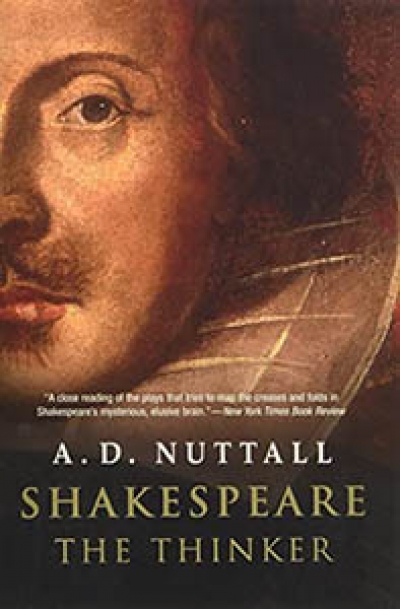William Shakespeare
Anyone who remembers Julie Taymor’s 1999 version of Titus Andronicus, Shakespeare’s first published play, will not be expecting a reverential treatment of what is reputedly his last, but Taymor’s new film does move more or less inexorably to the play’s final wisdom: ‘The rarer action is / In virtue than in vengeance.’ The Tempest is a d ...
The Cambridge Introduction to Shakespeare’s Comedies by Penny Gay
Recently I engaged in an act of bad faith as a teacher. I set my second-year Shakespeare students a ‘research essay’ as a final piece of assessment, and insisted that they engage with primary scholarship – hardcover monographs and scholarly articles – if they wanted to do well. The problem is that industrial-strength literary criticism is almost unintelligible to undergraduates, and that is not entirely their fault. I knew this, but went ahead and set a criterion I knew would benefit only the tiny minority who might go on to a higher degree. The bulk of my students, who will be teaching adolescent South Australians Romeo + Juliet for decades to come, may never get around to thanking me.
... (read more)‘This book is a celebration of art that doubles as a critique of religion,’ writes Peter Conrad in the introduction to this enormous book. Neither aim is especially unusual, but their ambitious fusion here creates a questing mesh of narratives, huge in scope, in which architecture, music, literature, drama, motion pictures, poetry and philosophy in many schools and eras are gathered under the sprawling rubric of art, and no religious tradition is excluded. At times it feels as if you are reading a book about everything, and its restlessness carries you through thirty-three extremely solid, occasionally indigestible chapters, beginning with Mary Shelley’s Frankenstein.
... (read more)The greatest play by the greatest playwright, Hamlet has over the centuries daunted readers far older than Holden Caulfield. Today, however, he would have another choice: he could read the novel of the play, and one written especially for his age group. John Marsden, the Pied Piper of Australian YA literature, has decided to lead his vast army of devotees into Shakespeare country – to be specific, Elsinore. And why not? The progress from adolescence to maturity is the very stuff of YA fiction, and Hamlet is a story about growing up. Most stage Hamlets are too old. Holden describes the Danish prince as a ‘sad, screwed-up type guy’, and one of the defining features of Marsden’s often dark fiction is exactly this kind of young protagonist.
... (read more)Shakespeare the Thinking is the final and posthumously published book of the Oxford critic A.D. Nuttall, who died unexpectedly in January 2007. Pitched at a wider readership than most of his earlier writings, the book is the culmination of Nuttall’s lifetime thinking about Shakespeare, and the work by which his remarkable originality as a critic will no doubt be most widely recognised.
... (read more)Those who would have us believe that William Shakespeare was not the author of the poems and plays that bear his name – J. Thomas Looney and Sherwood Silliman come to mind – like to encourage the idea that almost nothing is known about his life. In fact, we have quite a lot of information about Shakespeare’s life, career and the cultural environment in which he wrote. What we do lack is any direct testimony from the man himself. His opinions are lost to us. There are no letters or journals that might illuminate his private thoughts and feelings. The basic facts of Shakespeare’s life (1564–1616) are largely set out in official documents recording births, deaths, marriages and legal transactions. If we must inquire into the nature of his personal relationships, the options are either to try and extrapolate his views from his poetry and dramatic works (an impossibly compromised practice), or else turn to circumstantial evidence and weigh up possibilities.
... (read more)In James Joyce’s Ulysses, Shakespeare is referred to as the happy hunting ground of all minds which have lost their balance. He is also referred to by Buck Mulligan, even less reverently, though with a distinct nationalist tilt, as ‘Shakespeare. I seem to recall the name. Ah, to be sure, the fellow who writes like Synge.’ Well, there probably are analogies between the greatest of all dramatists, who could also, as Donald Davie pointed out, use any word in the language he chose (and hence manipulated an extended diction), and the chap who set the Abbey Theatre stage on fire with the dynamic stylisation of Irish peasant speech in The Playboy of the Western World. Just as there are analogies between the poet who could write King Lear and the lonely Jesuit who wrote, ‘O the mind, mind has mountains: cliffs of fall / Frightful, sheer no-man-fathomed: / Hold them cheap may who ne’er hung there’, and all those tragic sonnets. Not to mention the fellow who posed in front of the bookshop sign in Paris.
... (read more)Othello as tragedy: Some problems of judgment and feeling by Jane Adamson
The title of this book accurately represents Jane Adamson’s approach to Othello, her view of the play, and her critical achievement. Rejecting from the outset the ‘conventionalist’ approach, which would have us discount our own responses and treat the play as ‘artificial’, a ‘purely dramatic phenomenon’ (ars gratia artis: the old lie), she bases her critical judgment on a systematic consideration of the feelings it arouses. This leads her to the view that. the connection (or disconnection) between the characters’ feelings and their judgments is at the heart of the play, and at the heart of the tragedy.
... (read more)In some basic respects, The Recurring Miracle and Antic Fables represent opposite ways of approaching Shakespeare.
... (read more)






